Commercial Law: Ownership of Lottery Tickets and Contractual Issues
VerifiedAdded on 2023/06/15
|6
|2509
|153
Case Study
AI Summary
This case study delves into three distinct commercial law scenarios. The first examines the ownership rights of a lottery ticket, contrasting absolute ownership with possessory rights and applying principles from cases like *Moffatt v Kazana* and *Parker v British Airways*. It concludes that the original purchaser, Dave, retains absolute rights. The second scenario analyzes a contract breach under the Sales of Goods Act (SGA) 1995, determining Brian's entitlement to remedies due to Dave's failure to deliver the agreed quantity and quality of goods. The analysis references *Behrend & Co v Produce Brokers' Co* and *Jackson v Rotax motor & cycle Co Ltd* to support the claim that Brian can terminate the contract. The third scenario assesses Dave's contractual position regarding the transfer of property under the SGA, clarifying when the risk and ownership of goods transfer from seller to buyer, highlighting the importance of ascertained goods and the intention to transfer property as per Section 17 and 18 of SGA. Desklib offers a platform to explore more solved assignments and past papers related to commercial law.
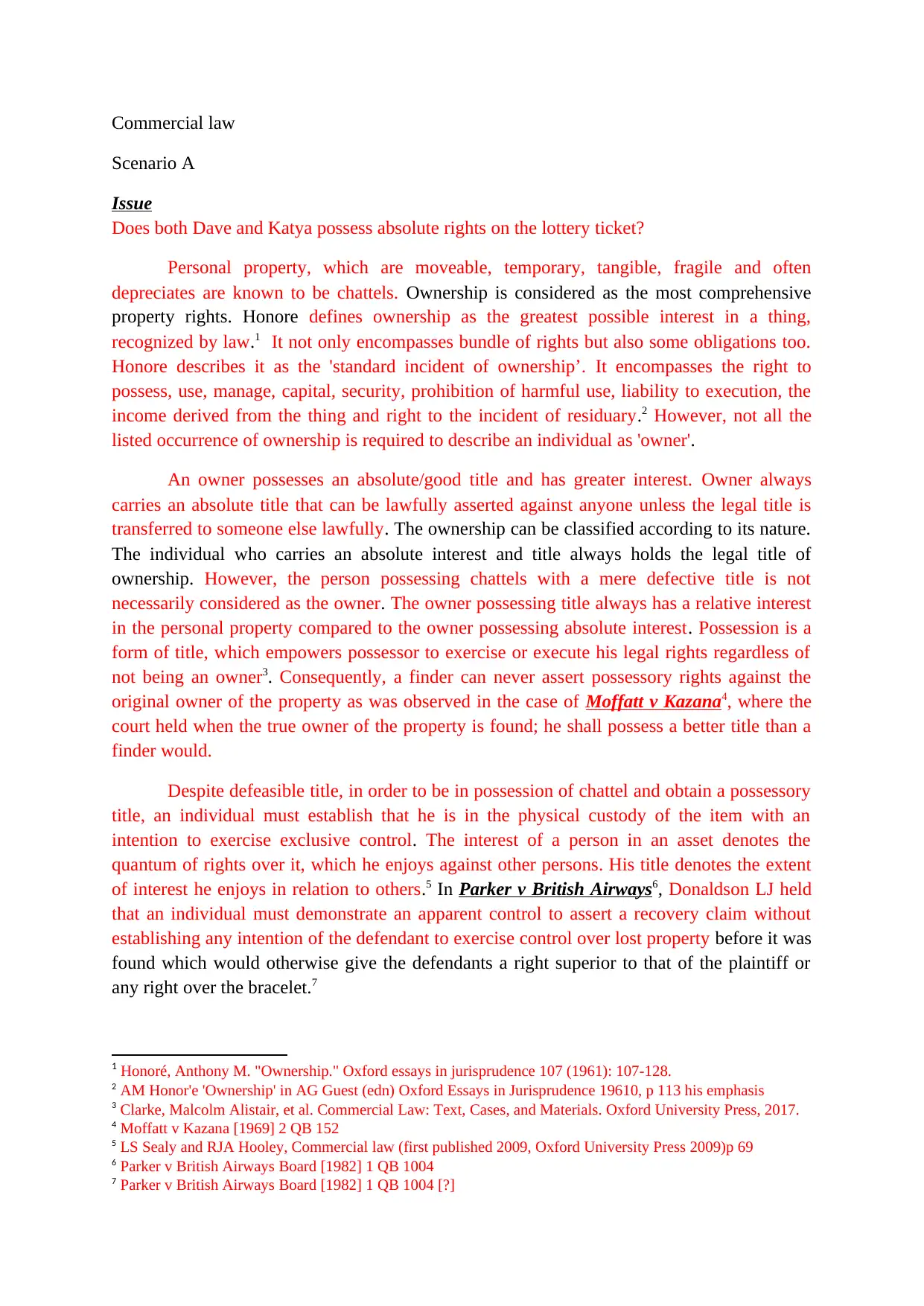
Commercial law
Scenario A
Issue
Does both Dave and Katya possess absolute rights on the lottery ticket?
Personal property, which are moveable, temporary, tangible, fragile and often
depreciates are known to be chattels. Ownership is considered as the most comprehensive
property rights. Honore defines ownership as the greatest possible interest in a thing,
recognized by law.1 It not only encompasses bundle of rights but also some obligations too.
Honore describes it as the 'standard incident of ownership’. It encompasses the right to
possess, use, manage, capital, security, prohibition of harmful use, liability to execution, the
income derived from the thing and right to the incident of residuary.2 However, not all the
listed occurrence of ownership is required to describe an individual as 'owner'.
An owner possesses an absolute/good title and has greater interest. Owner always
carries an absolute title that can be lawfully asserted against anyone unless the legal title is
transferred to someone else lawfully. The ownership can be classified according to its nature.
The individual who carries an absolute interest and title always holds the legal title of
ownership. However, the person possessing chattels with a mere defective title is not
necessarily considered as the owner. The owner possessing title always has a relative interest
in the personal property compared to the owner possessing absolute interest. Possession is a
form of title, which empowers possessor to exercise or execute his legal rights regardless of
not being an owner3. Consequently, a finder can never assert possessory rights against the
original owner of the property as was observed in the case of Moffatt v Kazana4, where the
court held when the true owner of the property is found; he shall possess a better title than a
finder would.
Despite defeasible title, in order to be in possession of chattel and obtain a possessory
title, an individual must establish that he is in the physical custody of the item with an
intention to exercise exclusive control. The interest of a person in an asset denotes the
quantum of rights over it, which he enjoys against other persons. His title denotes the extent
of interest he enjoys in relation to others.5 In Parker v British Airways6, Donaldson LJ held
that an individual must demonstrate an apparent control to assert a recovery claim without
establishing any intention of the defendant to exercise control over lost property before it was
found which would otherwise give the defendants a right superior to that of the plaintiff or
any right over the bracelet.7
1 Honoré, Anthony M. "Ownership." Oxford essays in jurisprudence 107 (1961): 107-128.
2 AM Honor'e 'Ownership' in AG Guest (edn) Oxford Essays in Jurisprudence 19610, p 113 his emphasis
3 Clarke, Malcolm Alistair, et al. Commercial Law: Text, Cases, and Materials. Oxford University Press, 2017.
4 Moffatt v Kazana [1969] 2 QB 152
5 LS Sealy and RJA Hooley, Commercial law (first published 2009, Oxford University Press 2009)p 69
6 Parker v British Airways Board [1982] 1 QB 1004
7 Parker v British Airways Board [1982] 1 QB 1004 [?]
Scenario A
Issue
Does both Dave and Katya possess absolute rights on the lottery ticket?
Personal property, which are moveable, temporary, tangible, fragile and often
depreciates are known to be chattels. Ownership is considered as the most comprehensive
property rights. Honore defines ownership as the greatest possible interest in a thing,
recognized by law.1 It not only encompasses bundle of rights but also some obligations too.
Honore describes it as the 'standard incident of ownership’. It encompasses the right to
possess, use, manage, capital, security, prohibition of harmful use, liability to execution, the
income derived from the thing and right to the incident of residuary.2 However, not all the
listed occurrence of ownership is required to describe an individual as 'owner'.
An owner possesses an absolute/good title and has greater interest. Owner always
carries an absolute title that can be lawfully asserted against anyone unless the legal title is
transferred to someone else lawfully. The ownership can be classified according to its nature.
The individual who carries an absolute interest and title always holds the legal title of
ownership. However, the person possessing chattels with a mere defective title is not
necessarily considered as the owner. The owner possessing title always has a relative interest
in the personal property compared to the owner possessing absolute interest. Possession is a
form of title, which empowers possessor to exercise or execute his legal rights regardless of
not being an owner3. Consequently, a finder can never assert possessory rights against the
original owner of the property as was observed in the case of Moffatt v Kazana4, where the
court held when the true owner of the property is found; he shall possess a better title than a
finder would.
Despite defeasible title, in order to be in possession of chattel and obtain a possessory
title, an individual must establish that he is in the physical custody of the item with an
intention to exercise exclusive control. The interest of a person in an asset denotes the
quantum of rights over it, which he enjoys against other persons. His title denotes the extent
of interest he enjoys in relation to others.5 In Parker v British Airways6, Donaldson LJ held
that an individual must demonstrate an apparent control to assert a recovery claim without
establishing any intention of the defendant to exercise control over lost property before it was
found which would otherwise give the defendants a right superior to that of the plaintiff or
any right over the bracelet.7
1 Honoré, Anthony M. "Ownership." Oxford essays in jurisprudence 107 (1961): 107-128.
2 AM Honor'e 'Ownership' in AG Guest (edn) Oxford Essays in Jurisprudence 19610, p 113 his emphasis
3 Clarke, Malcolm Alistair, et al. Commercial Law: Text, Cases, and Materials. Oxford University Press, 2017.
4 Moffatt v Kazana [1969] 2 QB 152
5 LS Sealy and RJA Hooley, Commercial law (first published 2009, Oxford University Press 2009)p 69
6 Parker v British Airways Board [1982] 1 QB 1004
7 Parker v British Airways Board [1982] 1 QB 1004 [?]
Paraphrase This Document
Need a fresh take? Get an instant paraphrase of this document with our AI Paraphraser
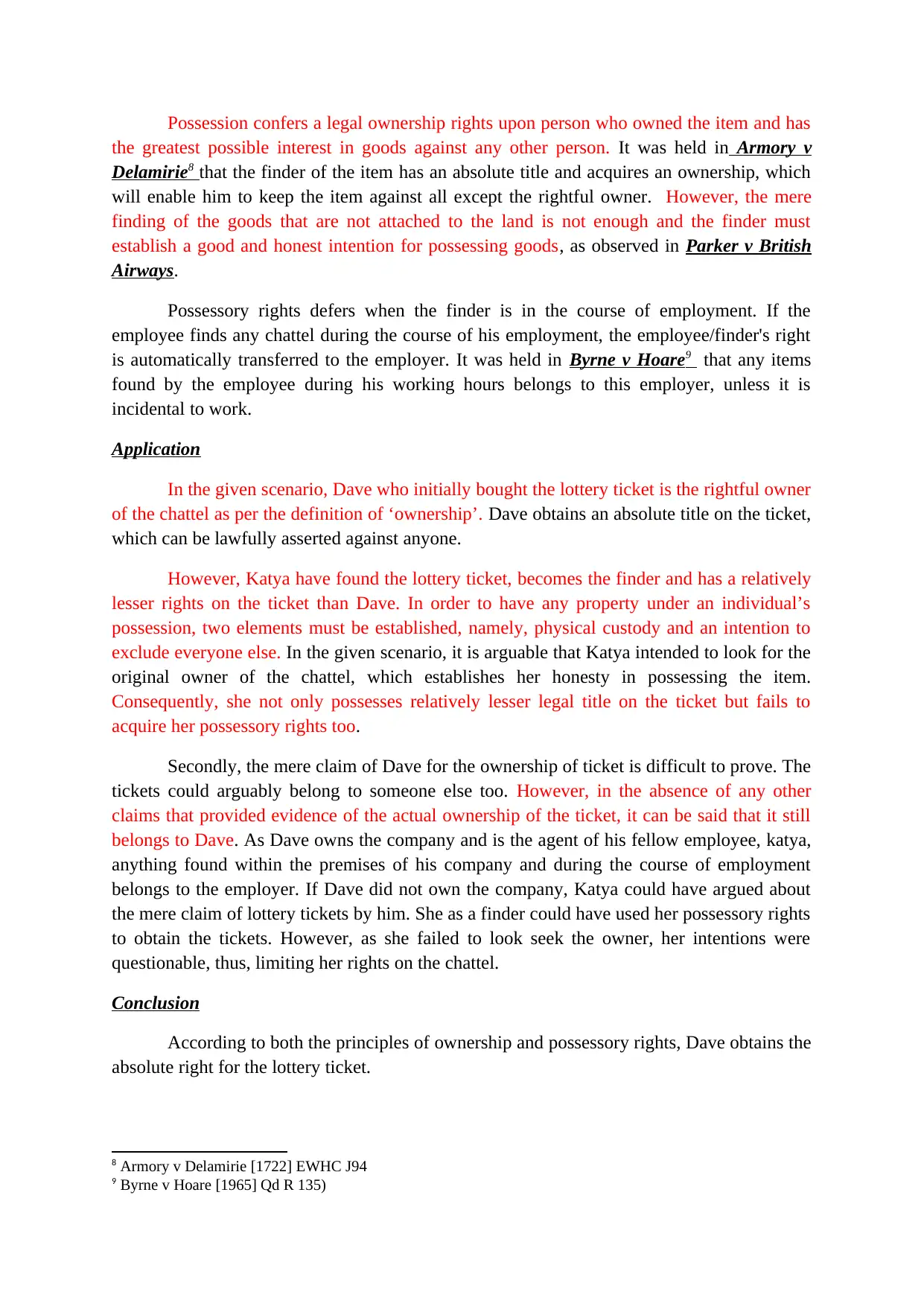
Possession confers a legal ownership rights upon person who owned the item and has
the greatest possible interest in goods against any other person. It was held in Armory v
Delamirie8 that the finder of the item has an absolute title and acquires an ownership, which
will enable him to keep the item against all except the rightful owner. However, the mere
finding of the goods that are not attached to the land is not enough and the finder must
establish a good and honest intention for possessing goods, as observed in Parker v British
Airways.
Possessory rights defers when the finder is in the course of employment. If the
employee finds any chattel during the course of his employment, the employee/finder's right
is automatically transferred to the employer. It was held in Byrne v Hoare9 that any items
found by the employee during his working hours belongs to this employer, unless it is
incidental to work.
Application
In the given scenario, Dave who initially bought the lottery ticket is the rightful owner
of the chattel as per the definition of ‘ownership’. Dave obtains an absolute title on the ticket,
which can be lawfully asserted against anyone.
However, Katya have found the lottery ticket, becomes the finder and has a relatively
lesser rights on the ticket than Dave. In order to have any property under an individual’s
possession, two elements must be established, namely, physical custody and an intention to
exclude everyone else. In the given scenario, it is arguable that Katya intended to look for the
original owner of the chattel, which establishes her honesty in possessing the item.
Consequently, she not only possesses relatively lesser legal title on the ticket but fails to
acquire her possessory rights too.
Secondly, the mere claim of Dave for the ownership of ticket is difficult to prove. The
tickets could arguably belong to someone else too. However, in the absence of any other
claims that provided evidence of the actual ownership of the ticket, it can be said that it still
belongs to Dave. As Dave owns the company and is the agent of his fellow employee, katya,
anything found within the premises of his company and during the course of employment
belongs to the employer. If Dave did not own the company, Katya could have argued about
the mere claim of lottery tickets by him. She as a finder could have used her possessory rights
to obtain the tickets. However, as she failed to look seek the owner, her intentions were
questionable, thus, limiting her rights on the chattel.
Conclusion
According to both the principles of ownership and possessory rights, Dave obtains the
absolute right for the lottery ticket.
8 Armory v Delamirie [1722] EWHC J94
9 Byrne v Hoare [1965] Qd R 135)
the greatest possible interest in goods against any other person. It was held in Armory v
Delamirie8 that the finder of the item has an absolute title and acquires an ownership, which
will enable him to keep the item against all except the rightful owner. However, the mere
finding of the goods that are not attached to the land is not enough and the finder must
establish a good and honest intention for possessing goods, as observed in Parker v British
Airways.
Possessory rights defers when the finder is in the course of employment. If the
employee finds any chattel during the course of his employment, the employee/finder's right
is automatically transferred to the employer. It was held in Byrne v Hoare9 that any items
found by the employee during his working hours belongs to this employer, unless it is
incidental to work.
Application
In the given scenario, Dave who initially bought the lottery ticket is the rightful owner
of the chattel as per the definition of ‘ownership’. Dave obtains an absolute title on the ticket,
which can be lawfully asserted against anyone.
However, Katya have found the lottery ticket, becomes the finder and has a relatively
lesser rights on the ticket than Dave. In order to have any property under an individual’s
possession, two elements must be established, namely, physical custody and an intention to
exclude everyone else. In the given scenario, it is arguable that Katya intended to look for the
original owner of the chattel, which establishes her honesty in possessing the item.
Consequently, she not only possesses relatively lesser legal title on the ticket but fails to
acquire her possessory rights too.
Secondly, the mere claim of Dave for the ownership of ticket is difficult to prove. The
tickets could arguably belong to someone else too. However, in the absence of any other
claims that provided evidence of the actual ownership of the ticket, it can be said that it still
belongs to Dave. As Dave owns the company and is the agent of his fellow employee, katya,
anything found within the premises of his company and during the course of employment
belongs to the employer. If Dave did not own the company, Katya could have argued about
the mere claim of lottery tickets by him. She as a finder could have used her possessory rights
to obtain the tickets. However, as she failed to look seek the owner, her intentions were
questionable, thus, limiting her rights on the chattel.
Conclusion
According to both the principles of ownership and possessory rights, Dave obtains the
absolute right for the lottery ticket.
8 Armory v Delamirie [1722] EWHC J94
9 Byrne v Hoare [1965] Qd R 135)
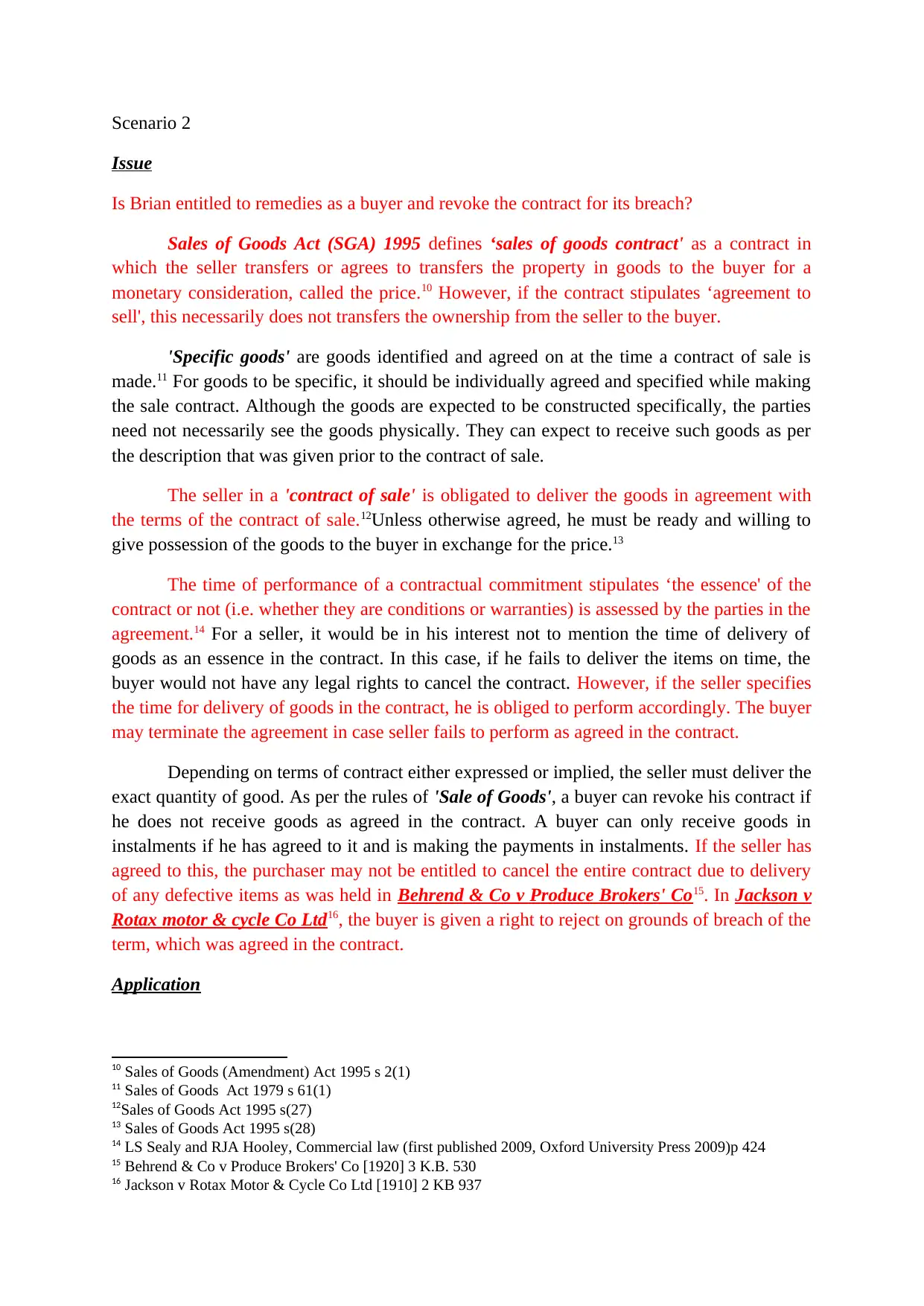
Scenario 2
Issue
Is Brian entitled to remedies as a buyer and revoke the contract for its breach?
Sales of Goods Act (SGA) 1995 defines ‘sales of goods contract' as a contract in
which the seller transfers or agrees to transfers the property in goods to the buyer for a
monetary consideration, called the price.10 However, if the contract stipulates ‘agreement to
sell', this necessarily does not transfers the ownership from the seller to the buyer.
'Specific goods' are goods identified and agreed on at the time a contract of sale is
made.11 For goods to be specific, it should be individually agreed and specified while making
the sale contract. Although the goods are expected to be constructed specifically, the parties
need not necessarily see the goods physically. They can expect to receive such goods as per
the description that was given prior to the contract of sale.
The seller in a 'contract of sale' is obligated to deliver the goods in agreement with
the terms of the contract of sale.12Unless otherwise agreed, he must be ready and willing to
give possession of the goods to the buyer in exchange for the price.13
The time of performance of a contractual commitment stipulates ‘the essence' of the
contract or not (i.e. whether they are conditions or warranties) is assessed by the parties in the
agreement.14 For a seller, it would be in his interest not to mention the time of delivery of
goods as an essence in the contract. In this case, if he fails to deliver the items on time, the
buyer would not have any legal rights to cancel the contract. However, if the seller specifies
the time for delivery of goods in the contract, he is obliged to perform accordingly. The buyer
may terminate the agreement in case seller fails to perform as agreed in the contract.
Depending on terms of contract either expressed or implied, the seller must deliver the
exact quantity of good. As per the rules of 'Sale of Goods', a buyer can revoke his contract if
he does not receive goods as agreed in the contract. A buyer can only receive goods in
instalments if he has agreed to it and is making the payments in instalments. If the seller has
agreed to this, the purchaser may not be entitled to cancel the entire contract due to delivery
of any defective items as was held in Behrend & Co v Produce Brokers' Co15. In Jackson v
Rotax motor & cycle Co Ltd16, the buyer is given a right to reject on grounds of breach of the
term, which was agreed in the contract.
Application
10 Sales of Goods (Amendment) Act 1995 s 2(1)
11 Sales of Goods Act 1979 s 61(1)
12Sales of Goods Act 1995 s(27)
13 Sales of Goods Act 1995 s(28)
14 LS Sealy and RJA Hooley, Commercial law (first published 2009, Oxford University Press 2009)p 424
15 Behrend & Co v Produce Brokers' Co [1920] 3 K.B. 530
16 Jackson v Rotax Motor & Cycle Co Ltd [1910] 2 KB 937
Issue
Is Brian entitled to remedies as a buyer and revoke the contract for its breach?
Sales of Goods Act (SGA) 1995 defines ‘sales of goods contract' as a contract in
which the seller transfers or agrees to transfers the property in goods to the buyer for a
monetary consideration, called the price.10 However, if the contract stipulates ‘agreement to
sell', this necessarily does not transfers the ownership from the seller to the buyer.
'Specific goods' are goods identified and agreed on at the time a contract of sale is
made.11 For goods to be specific, it should be individually agreed and specified while making
the sale contract. Although the goods are expected to be constructed specifically, the parties
need not necessarily see the goods physically. They can expect to receive such goods as per
the description that was given prior to the contract of sale.
The seller in a 'contract of sale' is obligated to deliver the goods in agreement with
the terms of the contract of sale.12Unless otherwise agreed, he must be ready and willing to
give possession of the goods to the buyer in exchange for the price.13
The time of performance of a contractual commitment stipulates ‘the essence' of the
contract or not (i.e. whether they are conditions or warranties) is assessed by the parties in the
agreement.14 For a seller, it would be in his interest not to mention the time of delivery of
goods as an essence in the contract. In this case, if he fails to deliver the items on time, the
buyer would not have any legal rights to cancel the contract. However, if the seller specifies
the time for delivery of goods in the contract, he is obliged to perform accordingly. The buyer
may terminate the agreement in case seller fails to perform as agreed in the contract.
Depending on terms of contract either expressed or implied, the seller must deliver the
exact quantity of good. As per the rules of 'Sale of Goods', a buyer can revoke his contract if
he does not receive goods as agreed in the contract. A buyer can only receive goods in
instalments if he has agreed to it and is making the payments in instalments. If the seller has
agreed to this, the purchaser may not be entitled to cancel the entire contract due to delivery
of any defective items as was held in Behrend & Co v Produce Brokers' Co15. In Jackson v
Rotax motor & cycle Co Ltd16, the buyer is given a right to reject on grounds of breach of the
term, which was agreed in the contract.
Application
10 Sales of Goods (Amendment) Act 1995 s 2(1)
11 Sales of Goods Act 1979 s 61(1)
12Sales of Goods Act 1995 s(27)
13 Sales of Goods Act 1995 s(28)
14 LS Sealy and RJA Hooley, Commercial law (first published 2009, Oxford University Press 2009)p 424
15 Behrend & Co v Produce Brokers' Co [1920] 3 K.B. 530
16 Jackson v Rotax Motor & Cycle Co Ltd [1910] 2 KB 937
⊘ This is a preview!⊘
Do you want full access?
Subscribe today to unlock all pages.

Trusted by 1+ million students worldwide
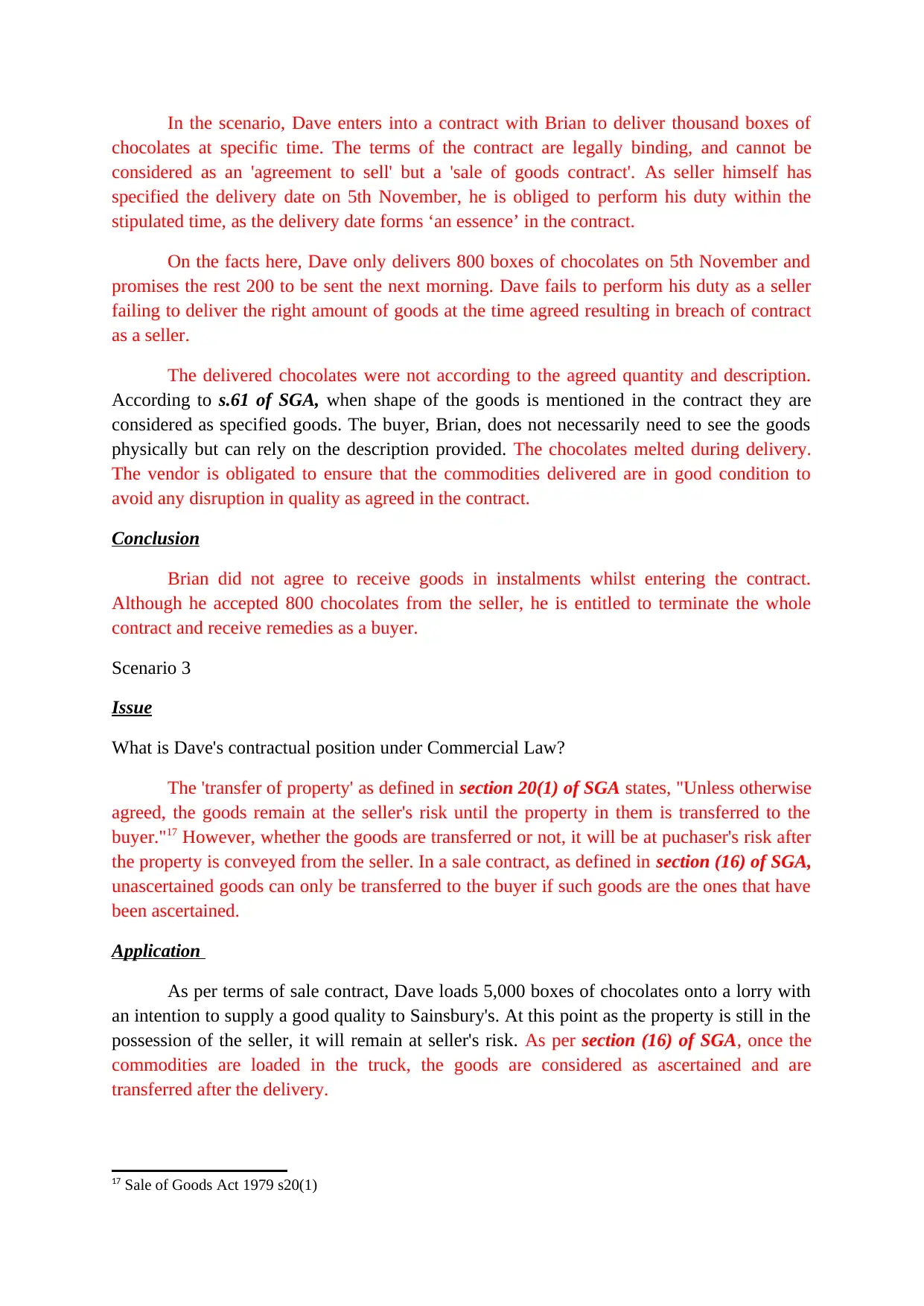
In the scenario, Dave enters into a contract with Brian to deliver thousand boxes of
chocolates at specific time. The terms of the contract are legally binding, and cannot be
considered as an 'agreement to sell' but a 'sale of goods contract'. As seller himself has
specified the delivery date on 5th November, he is obliged to perform his duty within the
stipulated time, as the delivery date forms ‘an essence’ in the contract.
On the facts here, Dave only delivers 800 boxes of chocolates on 5th November and
promises the rest 200 to be sent the next morning. Dave fails to perform his duty as a seller
failing to deliver the right amount of goods at the time agreed resulting in breach of contract
as a seller.
The delivered chocolates were not according to the agreed quantity and description.
According to s.61 of SGA, when shape of the goods is mentioned in the contract they are
considered as specified goods. The buyer, Brian, does not necessarily need to see the goods
physically but can rely on the description provided. The chocolates melted during delivery.
The vendor is obligated to ensure that the commodities delivered are in good condition to
avoid any disruption in quality as agreed in the contract.
Conclusion
Brian did not agree to receive goods in instalments whilst entering the contract.
Although he accepted 800 chocolates from the seller, he is entitled to terminate the whole
contract and receive remedies as a buyer.
Scenario 3
Issue
What is Dave's contractual position under Commercial Law?
The 'transfer of property' as defined in section 20(1) of SGA states, "Unless otherwise
agreed, the goods remain at the seller's risk until the property in them is transferred to the
buyer."17 However, whether the goods are transferred or not, it will be at puchaser's risk after
the property is conveyed from the seller. In a sale contract, as defined in section (16) of SGA,
unascertained goods can only be transferred to the buyer if such goods are the ones that have
been ascertained.
Application
As per terms of sale contract, Dave loads 5,000 boxes of chocolates onto a lorry with
an intention to supply a good quality to Sainsbury's. At this point as the property is still in the
possession of the seller, it will remain at seller's risk. As per section (16) of SGA, once the
commodities are loaded in the truck, the goods are considered as ascertained and are
transferred after the delivery.
17 Sale of Goods Act 1979 s20(1)
chocolates at specific time. The terms of the contract are legally binding, and cannot be
considered as an 'agreement to sell' but a 'sale of goods contract'. As seller himself has
specified the delivery date on 5th November, he is obliged to perform his duty within the
stipulated time, as the delivery date forms ‘an essence’ in the contract.
On the facts here, Dave only delivers 800 boxes of chocolates on 5th November and
promises the rest 200 to be sent the next morning. Dave fails to perform his duty as a seller
failing to deliver the right amount of goods at the time agreed resulting in breach of contract
as a seller.
The delivered chocolates were not according to the agreed quantity and description.
According to s.61 of SGA, when shape of the goods is mentioned in the contract they are
considered as specified goods. The buyer, Brian, does not necessarily need to see the goods
physically but can rely on the description provided. The chocolates melted during delivery.
The vendor is obligated to ensure that the commodities delivered are in good condition to
avoid any disruption in quality as agreed in the contract.
Conclusion
Brian did not agree to receive goods in instalments whilst entering the contract.
Although he accepted 800 chocolates from the seller, he is entitled to terminate the whole
contract and receive remedies as a buyer.
Scenario 3
Issue
What is Dave's contractual position under Commercial Law?
The 'transfer of property' as defined in section 20(1) of SGA states, "Unless otherwise
agreed, the goods remain at the seller's risk until the property in them is transferred to the
buyer."17 However, whether the goods are transferred or not, it will be at puchaser's risk after
the property is conveyed from the seller. In a sale contract, as defined in section (16) of SGA,
unascertained goods can only be transferred to the buyer if such goods are the ones that have
been ascertained.
Application
As per terms of sale contract, Dave loads 5,000 boxes of chocolates onto a lorry with
an intention to supply a good quality to Sainsbury's. At this point as the property is still in the
possession of the seller, it will remain at seller's risk. As per section (16) of SGA, once the
commodities are loaded in the truck, the goods are considered as ascertained and are
transferred after the delivery.
17 Sale of Goods Act 1979 s20(1)
Paraphrase This Document
Need a fresh take? Get an instant paraphrase of this document with our AI Paraphraser
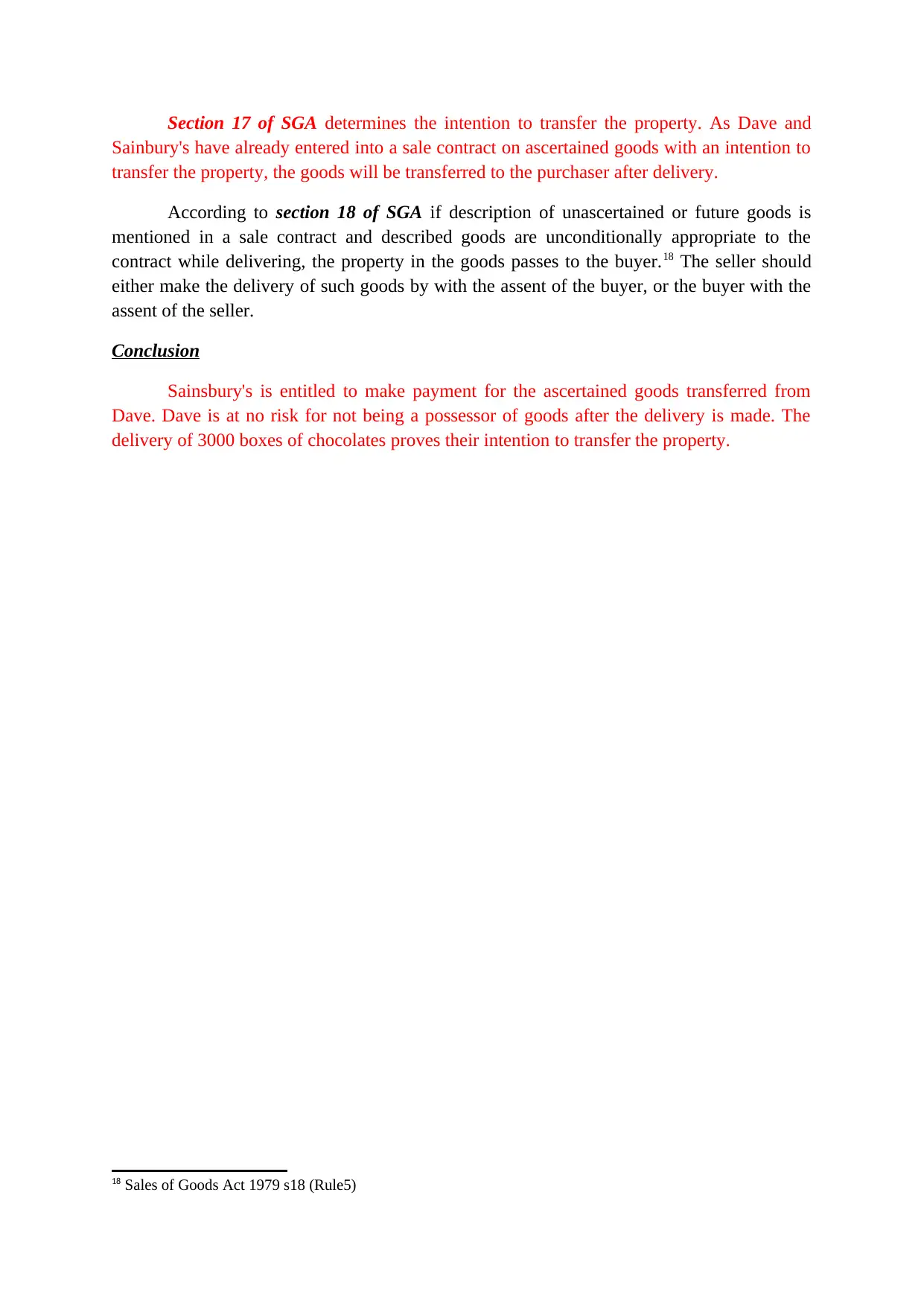
Section 17 of SGA determines the intention to transfer the property. As Dave and
Sainbury's have already entered into a sale contract on ascertained goods with an intention to
transfer the property, the goods will be transferred to the purchaser after delivery.
According to section 18 of SGA if description of unascertained or future goods is
mentioned in a sale contract and described goods are unconditionally appropriate to the
contract while delivering, the property in the goods passes to the buyer.18 The seller should
either make the delivery of such goods by with the assent of the buyer, or the buyer with the
assent of the seller.
Conclusion
Sainsbury's is entitled to make payment for the ascertained goods transferred from
Dave. Dave is at no risk for not being a possessor of goods after the delivery is made. The
delivery of 3000 boxes of chocolates proves their intention to transfer the property.
18 Sales of Goods Act 1979 s18 (Rule5)
Sainbury's have already entered into a sale contract on ascertained goods with an intention to
transfer the property, the goods will be transferred to the purchaser after delivery.
According to section 18 of SGA if description of unascertained or future goods is
mentioned in a sale contract and described goods are unconditionally appropriate to the
contract while delivering, the property in the goods passes to the buyer.18 The seller should
either make the delivery of such goods by with the assent of the buyer, or the buyer with the
assent of the seller.
Conclusion
Sainsbury's is entitled to make payment for the ascertained goods transferred from
Dave. Dave is at no risk for not being a possessor of goods after the delivery is made. The
delivery of 3000 boxes of chocolates proves their intention to transfer the property.
18 Sales of Goods Act 1979 s18 (Rule5)
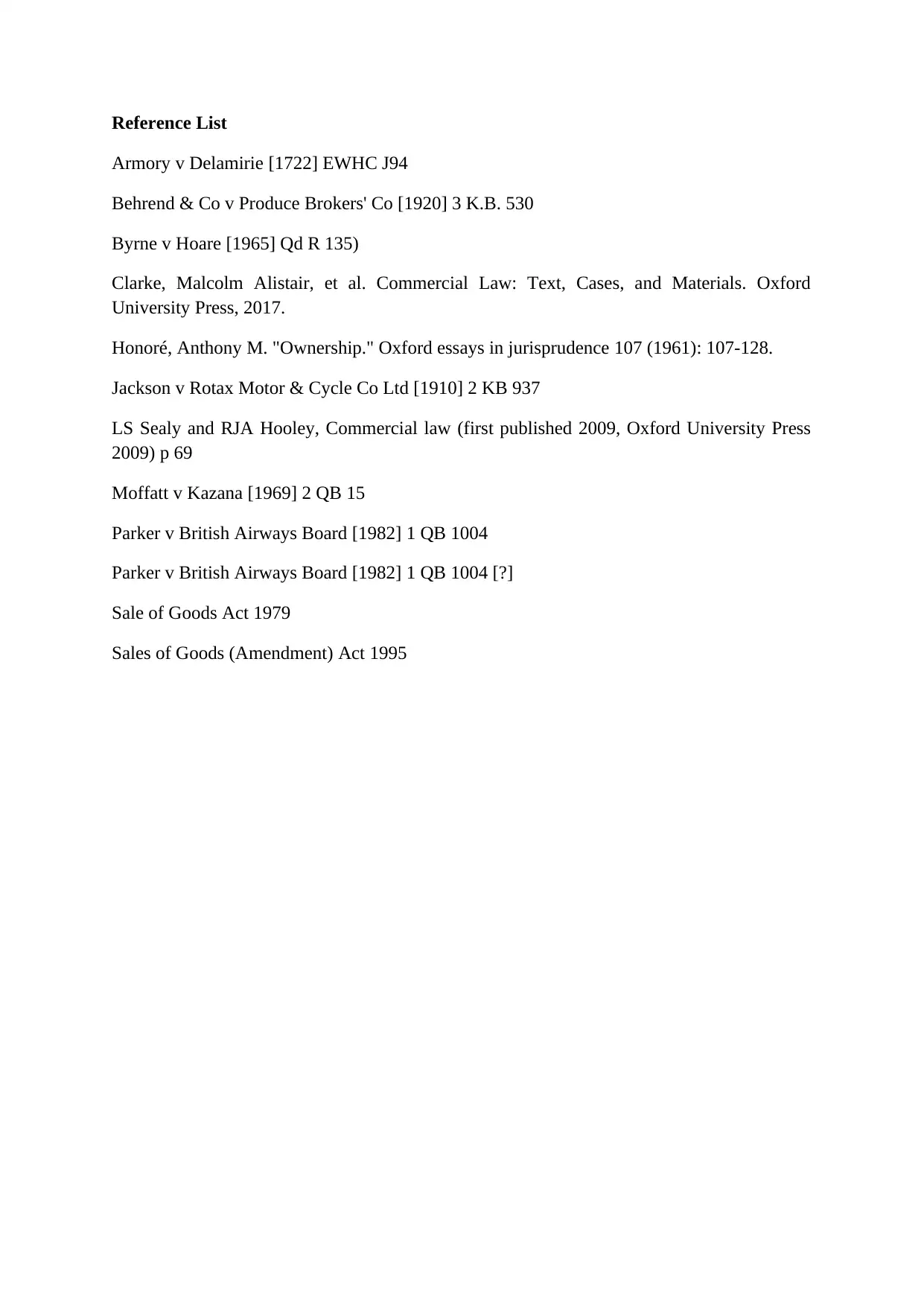
Reference List
Armory v Delamirie [1722] EWHC J94
Behrend & Co v Produce Brokers' Co [1920] 3 K.B. 530
Byrne v Hoare [1965] Qd R 135)
Clarke, Malcolm Alistair, et al. Commercial Law: Text, Cases, and Materials. Oxford
University Press, 2017.
Honoré, Anthony M. "Ownership." Oxford essays in jurisprudence 107 (1961): 107-128.
Jackson v Rotax Motor & Cycle Co Ltd [1910] 2 KB 937
LS Sealy and RJA Hooley, Commercial law (first published 2009, Oxford University Press
2009) p 69
Moffatt v Kazana [1969] 2 QB 15
Parker v British Airways Board [1982] 1 QB 1004
Parker v British Airways Board [1982] 1 QB 1004 [?]
Sale of Goods Act 1979
Sales of Goods (Amendment) Act 1995
Armory v Delamirie [1722] EWHC J94
Behrend & Co v Produce Brokers' Co [1920] 3 K.B. 530
Byrne v Hoare [1965] Qd R 135)
Clarke, Malcolm Alistair, et al. Commercial Law: Text, Cases, and Materials. Oxford
University Press, 2017.
Honoré, Anthony M. "Ownership." Oxford essays in jurisprudence 107 (1961): 107-128.
Jackson v Rotax Motor & Cycle Co Ltd [1910] 2 KB 937
LS Sealy and RJA Hooley, Commercial law (first published 2009, Oxford University Press
2009) p 69
Moffatt v Kazana [1969] 2 QB 15
Parker v British Airways Board [1982] 1 QB 1004
Parker v British Airways Board [1982] 1 QB 1004 [?]
Sale of Goods Act 1979
Sales of Goods (Amendment) Act 1995
⊘ This is a preview!⊘
Do you want full access?
Subscribe today to unlock all pages.

Trusted by 1+ million students worldwide
1 out of 6
Your All-in-One AI-Powered Toolkit for Academic Success.
+13062052269
info@desklib.com
Available 24*7 on WhatsApp / Email
![[object Object]](/_next/static/media/star-bottom.7253800d.svg)
Unlock your academic potential
Copyright © 2020–2026 A2Z Services. All Rights Reserved. Developed and managed by ZUCOL.

